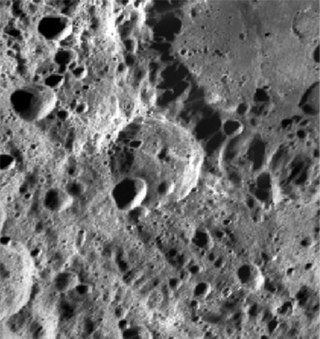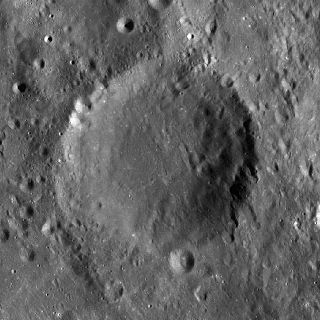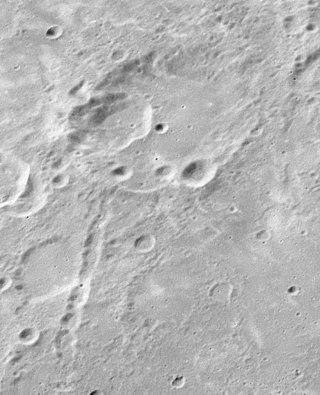
Thebit is a lunar impact crater located on the southeast shore of Mare Nubium. To the north-northwest is the crater Arzachel, and Purbach lies to the south-southwest. To the southwest is the flooded remnants of Thebit P, which is actually larger in diameter than Thebit itself.
Abetti is a lunar impact crater that has been completely submerged by mare lavas. It forms a 'ghost crater' in the surface, showing only a curved rise where the rim is located. Abetti is located near the southeast edge of Mare Serenitatis, to the west of the Mons Argaeus. This crater is generally visible only at low angles of illumination. It is named after two Italian astronomers, Antonio Abetti and his son Giorgio.

Asada is a small lunar impact crater located at the northern edge of Mare Fecunditatis, to the northeast of the crater Taruntius. It is a circular crater formation with inner walls that slope down toward a small central floor at the midpoint. Asada was designated Taruntius A prior to being named by the IAU.

Boguslawsky is a lunar impact crater that is located near the southern lunar limb, to the northwest of the slightly larger crater Demonax, and southwest of the concentric crater Boussingault. Due to its location, this crater appears very oblong in shape because of foreshortening.
Aloha is a tiny impact crater on the Moon, that lies to the northwest of the Montes Agricola ridge, on the Oceanus Procellarum. It is located near the faint terminus of a ray that crosses the mare from the southeast, originating at the crater Glushko.

Boss is a lunar impact crater that is located along the northeast rim of the Moon's near side. Due to its location, the crater is viewed from the side by observers on the Earth, and its visibility is subject to libration effects.

Bohr is a lunar impact crater that is located near the western lunar limb, in the area that is affected by librations. It is attached to the southwestern rim of the larger, eroded Vasco da Gama formation, and to the southeast of the crater Einstein. The crater was observed for the first time in 1963, by Arthus and Ewen Whitaker in the book Rectified Lunar Atlas.

Belyaev is a lunar impact crater that is attached to the outer edge of the Mare Moscoviense, on the far side of the Moon. It is a worn formation with a small crater pair overlaying the southern rim, and several smaller craters across the relatively irregular interior.

Dechen is a small, bowl-shaped crater that is located in the northwest part of the Oceanus Procellarum, near the northwest limb of the Moon. The rim of the crater projects slightly above the surrounding lunar mare, and the interior is symmetrical and nearly featureless. It lies to the northeast of the crater Harding, but is otherwise relatively isolated.

Dunthorne is a small lunar impact crater that is located to the northwest of the small lunar mare called Palus Epidemiarum, in the southwest part of the Moon's near side. It was named after British astronomer Richard Dunthorne. It lies to the southwest of the crater Campanus, east of Vitello. Due south is Ramsden.

Elmer is a small lunar impact crater that is located to the south of Mare Smythii, near the eastern limb of the Moon. This crater is seen at a highly oblique angle from Earth, and the visibility is affected by libration. Elmer lies southwest of the crater Kreiken, and east-southeast of the larger Dale. This is a circular, bowl-shaped crater with an interior floor that occupies about half the total diameter.

Nichollet is a small, isolated lunar impact crater on the Mare Nubium, a lunar mare in the southwest quadrant of the Moon. It was named after French astronomer Joseph Nicollet. This crater is located to the north of the crater Pitatus, about midway between Wolf to the west and Birt to the east.

Coriolis is a lunar impact crater that is located on the far side of the Moon. The crater floor is bisected by the lunar equator, and it lies about three crater diameters northwest of the crater Daedalus.

Chaucer is a lunar impact crater that is located to the west of the walled plain Hertzsprung, on the far side of the Moon. It lies to the northwest of the crater Vavilov and east of the Tsander–Kibal'chich crater pair. This is a circular crater with a slightly eroded outer rim. The interior floor is nearly featureless, with only a few tiny craterlets marking the surface. It is named after the writer Geoffrey Chaucer.

Dziewulski is a lunar impact crater on the far side of the Moon. It lies between the craters Edison to the north and Popov to the south. The outer rim of this crater has been considerably worn by impacts, particularly along the southwest quadrant where the satellite crater Dziewulski Q overlies the rim and the interior floor. The northern rim is also heavily disrupted, and several small crater lie along the southeast rim. The interior floor and surrounding terrain has been resurfaced.

Dante is a lunar impact crater that is located on the far side of the Moon. It lies in the northern hemisphere exactly opposite the prime meridian facing the Earth. The nearest craters of note are Larmor to the north and Morse to the southeast. To the southwest is the oddly shaped Buys-Ballot.

Dellinger is a lunar impact crater that is located on the Moon's far side. It is attached to the southern rim of the crater Pannekoek. To the southeast lies the crater Marconi, and to the southwest is Chauvenet.

Florensky is a lunar impact crater that is attached to the northeastern rim of the larger crater Vernadskiy. It is located on the far side of the Moon and cannot be directly seen from the Earth. The rim of this crater has been heavily eroded and it forms an irregular ring about the uneven interior. This crater was previously identified as Vernadskiy B before being assigned a name by the IAU in 1985.

Aepinus is a small lunar impact crater located along the northern lunar limb, close to the north pole of the Moon. To the south east is the prominent crater Hermite.
Fibiger is a lunar impact crater located on the lunar near side near the northern pole. The nearest major feature is the Byrd crater. The crater was adopted and named after Danish pathologist Johannes Andreas Grib Fibiger in 2009 by the IAU. Located just north of Fibiger are craters Erlanger and Peary, which are 9.9 km and 73 km in diameter, respectively.





















